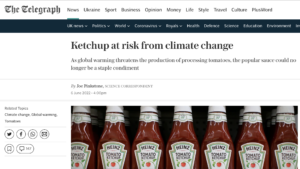https://newswwc.com/world/united-kingdom/ketchup-at-risk-from-climate-change/
https://www.telegraph.co.uk/news/2022/06/06/ketchup-risk-climate-change/
Tomato ketchup, a stalwart of British dinner tables, may soon be a much rarer commodity as climate change threatens to halve the fruit’s global harvest this century, according to a new study.
Ketchup is made from so-called processing tomatoes which are predominantly cultivated in California, Italy and China, all areas which are at-risk from global warming.
Soaring temperatures mean the tomato plants, like most crops worldwide, are being increasingly put under stress and a team of researchers led by Aarhus University in Denmark created a mathematical model to see how different future climate change scenarios would affect production.
“There are two types of cultivated tomato: one type for fresh consumption (for example, salad tomatoes), usually grown under controlled environments; and one type used for industrial transformation known as processing tomatoes (for example, canned tomatoes), which are usually grown under field conditions,” the researchers write in their paper, published in Nature Food.
“Processing tomatoes are important because they are used for tomato paste, tomato sauce, ketchup and other tomato-derived products.”
Tomato harvest could be halved
Around 180 million tonnes of tomatoes are grown every year, with two thirds made by just three countries: the United States, China and Italy.
Last year, the Intergovernmental Panel on Climate Change (IPCC) outlined five future global warming scenarios covering different levels of fossil fuel use and emissions.
Overall, the research found that by 2050, there would be around a six per cent decline in tomato production, with little difference between the five potential futures.
But between 2050 and 2100, there is a stark difference depending on the climate model used and in the worst-case scenario, the tomato harvest could be halved, data shows.
The worst-case scenario, also known as SSP5-8.5, would involve a temperature increase in the tomato-producing regions of about 2.6C between 2040 and 2069, and 5C for 2070–2099, when compared to the baseline period of between 1980 and 2009.
Under these stipulations, the computer model projected that the global harvest of processing tomatoes in the 11 biggest growers would drop from the current 14 million tonnes a year level to less than seven million tonnes.
Warmer temperatures reduce yield
Warmer temperatures speed up how quickly plants grow, resulting in a shorter time for fruit development and therefore reducing yield.




